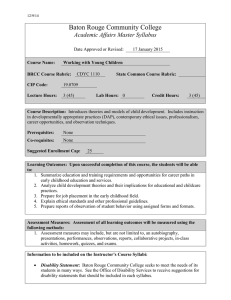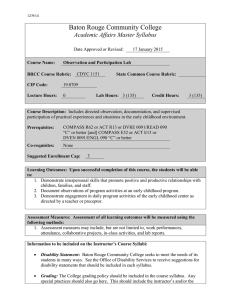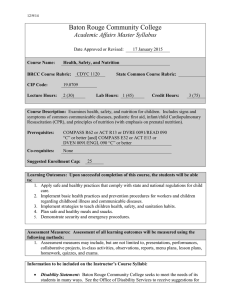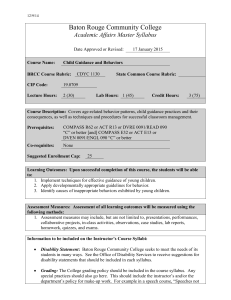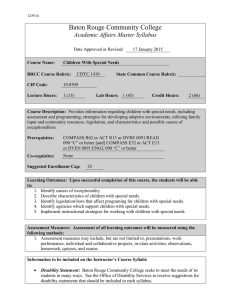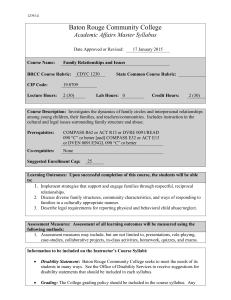Baton Rouge Community College Academic Affairs Master Syllabus
advertisement
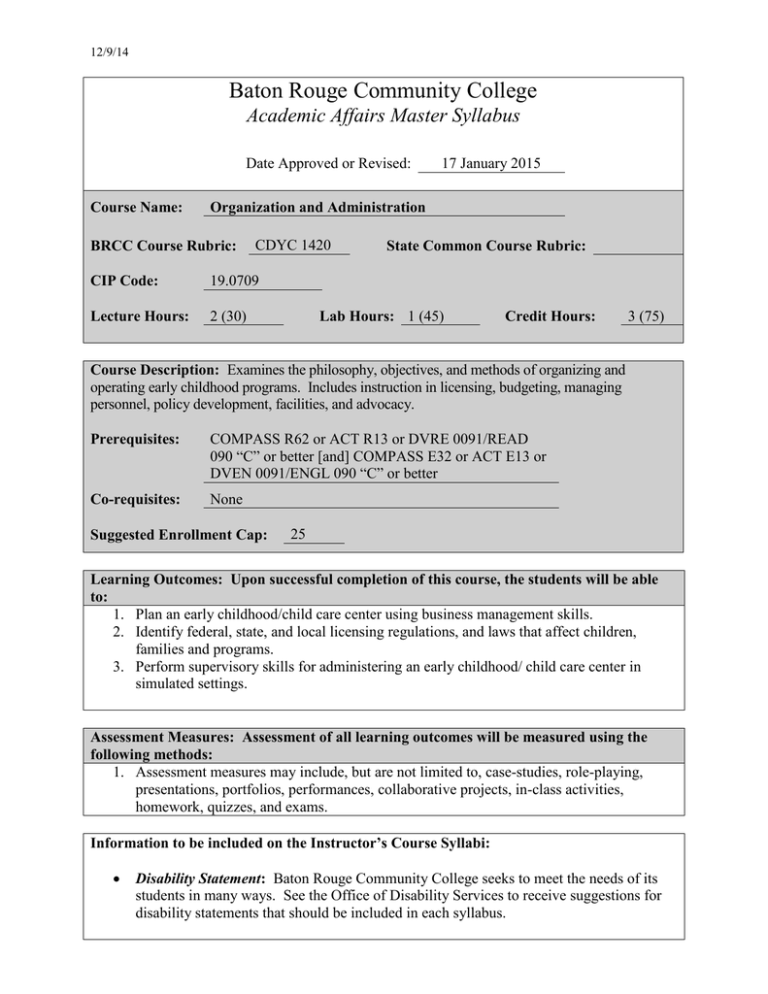
12/9/14 Baton Rouge Community College Academic Affairs Master Syllabus Date Approved or Revised: Course Name: 17 January 2015 Organization and Administration BRCC Course Rubric: CDYC 1420 CIP Code: 19.0709 Lecture Hours: 2 (30) State Common Course Rubric: Lab Hours: 1 (45) Credit Hours: 3 (75) Course Description: Examines the philosophy, objectives, and methods of organizing and operating early childhood programs. Includes instruction in licensing, budgeting, managing personnel, policy development, facilities, and advocacy. Prerequisites: COMPASS R62 or ACT R13 or DVRE 0091/READ 090 “C” or better [and] COMPASS E32 or ACT E13 or DVEN 0091/ENGL 090 “C” or better Co-requisites: None Suggested Enrollment Cap: 25 Learning Outcomes: Upon successful completion of this course, the students will be able to: 1. Plan an early childhood/child care center using business management skills. 2. Identify federal, state, and local licensing regulations, and laws that affect children, families and programs. 3. Perform supervisory skills for administering an early childhood/ child care center in simulated settings. Assessment Measures: Assessment of all learning outcomes will be measured using the following methods: 1. Assessment measures may include, but are not limited to, case-studies, role-playing, presentations, portfolios, performances, collaborative projects, in-class activities, homework, quizzes, and exams. Information to be included on the Instructor’s Course Syllabi: Disability Statement: Baton Rouge Community College seeks to meet the needs of its students in many ways. See the Office of Disability Services to receive suggestions for disability statements that should be included in each syllabus. Grading: The College grading policy should be included in the course syllabus. Any special practices should also go here. This should include the instructor’s and/or the department’s policy for make-up work. For example in a speech course, “Speeches not given on due date will receive no grade higher than a sixty” or “Make-up work will not be accepted after the last day of class.” Attendance Policy: Include the overall attendance policy of the college. Instructors may want to add additional information in individual syllabi to meet the needs of their courses. General Policies: Instructors’ policy on the use of things such as beepers and cell phones and/or hand held programmable calculators should be covered in this section. Cheating and Plagiarism: This must be included in all syllabi and should include the penalties for incidents in a given class. Students should have a clear idea of what constitutes cheating in a given course. Safety Concerns: In some programs this may be a major issue. For example, “No student will be allowed in the safety lab without safety glasses.” General statements such as, “Items that may be harmful to one’s self or others should not be brought to class.” Library/ Learning Resources: Since the development of the total person is part of our mission, assignments in the library and/or the Learning Resources Center should be included to assist students in enhancing skills and in using resources. Students should be encouraged to use the library for reading enjoyment as part of lifelong learning. Expanded Course Outline: I. Developing a program model for an early childhood learning environment II. Creating a facility plan for an early childhood learning environment III. Current State licensing laws and regulations for early childhood/child care centers V. Formulating personnel requirements, policies, and procedures for an early childhood/child care center that adhere to the State licensing laws/regulations V. Creating a plan for the entire financial responsibilities of an early childhood/child care center VI. Planning, presenting, and participating in professional staff development activities for the early childhood center VII. Maintaining a professional relationship with other students, children, and supervisory personnel VIII. Completing assigned tasks/duties competently and efficiently 2
